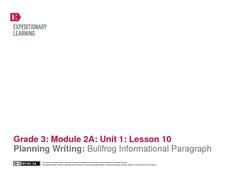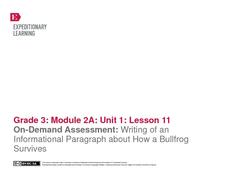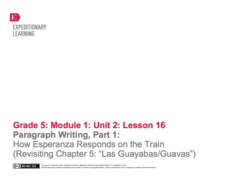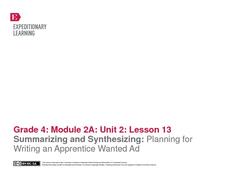Nancy Fetzer's Literacy Connections
Expository Paragraph
Upper elementary and middle school writers learn how to craft an expository paragraph by following the six steps detailed in a 48-page instructional guide. Learners learn how to write six different types of informational paragraphs: to...
Teachers.net
How to Write a Movie Review from a Pet's Perspective
When would two paws up denote a blockbuster film in your classroom? Only when young writers create movie reviews from a pet's perspective in this imaginative expository writing practice. This engaging topic begins with a class discussion...
EngageNY
Planning Writing: Bullfrog Information Paragraph
Lesson ten in this unit for the book Bullfrogs at Magnolia Circle, prepares third graders to begin writing an informational paragraph about the adaptations of bullfrogs. First, young writers work either independently or in pairs to...
Curated OER
How to Write an Essay: Secondary ed.
Whether introducing the structure of expository essays or reviewing the format with your high schoolers, take the time to check out this resource. Examples of seven common forms of introductory paragraphs and six types of conclusions, as...
EngageNY
On-Demand Assessment: Writing of an Information Paragraph About How a Bullfrog Survives
Having read and discussed Bullfrog at Magnolia Circle, third graders demonstrate their bullfrog expertise by writing informational paragraphs. Building on the note-taking and paragraph planning from the previous lesson plan, learners...
Curated OER
Hula How?
Third graders start writing papers with much more regularity than they did in the previous grades. They are starting to differentiate between the styles of writing and know why each is important. This activity gives the them a chance to...
K20 LEARN
Let Us Start The Lettuce Club (Or Not): Writing A Thesis Statement
Let us be frank! Writers learn that crafting a thesis statement is not that difficult if one peals back the layers. After watching several videos about the elements of a thesis, class members read the article "Lettuce Club helps students...
EngageNY
Grade 9 ELA Module 3, Unit 3, Lesson 3
Plagiarism is the theft of intellectual property. To avoid this crime, class members learn how to create a works cited page and how to craft in-text citations. After examining a high-performance model paragraph and an example of a works...
Curated OER
Writing Prompts for High School
Are you teaching a high school language arts class and stumped for writing topics? Five pages of writing prompts for all kinds of writing should help you out. Many of these prompts refer to texts that are not included in this resource,...
Overcoming Obstacles
Writing Reports
Following a review of how to research and take notes, scholars define the term paraphrase and identify ways to organize information and finish reports. To put their newfound knowledge to the test, learners interview a peer, take notes,...
Curated OER
Writing Prompts for High School
Here’s a great teacher resource - thirty-five writing prompts designed for high school writers. Categories include cause and effect, definition, expository/informative, persuasive, how to, descriptive, narrative, biographical narrative,...
EngageNY
Paragraph Writing, Part 1: How Esperanza Responds on the Train (Revisiting Chapter 5: "Las Guayabas/Guavas")
When your class members have completed the novel Esperanza Rising, they will be ready to write an expository essay on how Esperanza responds to events and what this says about her character. Set your pupils up for success by starting out...
West Contra Costa Unified School District
Expository Writing in Math
Pupils engage in an activity where one partner reads directions while the other follows those directions to complete a math task (such as bisecting an angle). As a reflection, they examine products to see what information the best...
EngageNY
Close Reading of Bullfrog at Magnolia Circle: Main Ideas about the Bullfrog
As your class reaches the end of the book Bullfrog at Magnolia Circle, the seventh lesson in this literary unit helps third graders transition from reading narrative to expository writing. Scholars develop their note-taking skills as...
Curated OER
Writing Classroom Agreements using Inspiration & Word to Go
How can you foster a thoughtful learning community for your class? First, the class brainstorms a list of behaviors that will help make the classroom a great place to learn. Then learners group similar ideas together and come up with...
Curated OER
"How To Build A Snowman" Expository Writing
Fourth graders write a "how to..." or an expository essay on building a snowman. They practice giving directions by explaining how to draw a person using shapes without mentioning that it's a person being drawn. They revise through the...
EngageNY
Summarizing and Synthesizing: Planning for Writing an Apprentice Wanted Ad
In instructional activity 13 of this unit on colonial trade, young researchers learn about apprentices as they prepare to write help-wanted ads for the specific trade they have been researching. To begin, the class listens closely as the...
Dream of a Nation
Writing an Analytic Essay
After researching an issue introduced in Tyson Miller's Dream of a Nation: Inspiring Ideas for a Better America, writers develop an original thesis statement and craft an analytic essay using evidence collected in their research.
K20 LEARN
Writing An Argumentative Paragraph: Argumentative Writing
Learning how to craft a cogent argument based on a solid claim, supported with evidence and solid reasoning, is an important life skill. Teach middle schoolers about argumentative writing with a lesson asking them to analyze the claims,...
Curated OER
Writing an Expository Paragraph Using Time Order - Ndakinna Wilderness Project
Teach your class how to camouflage themselves - and how to structure an expository paragraph - after learning about the Ndakinna Wilderness Project. They watch a video about observing nature, then discuss how to camouflage themselves....
Curated OER
Responses to Literature
Middle and high schoolers hone their writing skills by reading Rikki-Tikki-Tavi and the poem Sarah Cynthia Sylvia Stout Would Not Take the Garbage Out. They fill out a graphic organizer (included here), and use the organizer to write an...
Curated OER
Blogging to Create a Community of Writers #6: Writing a Review
Looking for a good social media lesson for your class? Then, this lesson is for you! They study various written reviews, then must choose an item to review of their choice. They can choose from: a book, restaurant, CD/musical...
Bright Hub Education
Using Evidence and Supporting Details in Writing
In expository writing, it is important to back up claims with evidence and details. Help your class to develop their writing with notes on different types of evidence. Once they have the basics down, practice with a sample thesis and...
Anti-Defamation League
Lonnie Chavis of 'This Is Us' Writes about Racism
Scholars read and discuss an essay by 12-year-old actor Lonnie Chaves about racism, paying close attention to how racism presents itself in interpersonal and institutional ways. Learners reflect on how they experience or witness racism...

























